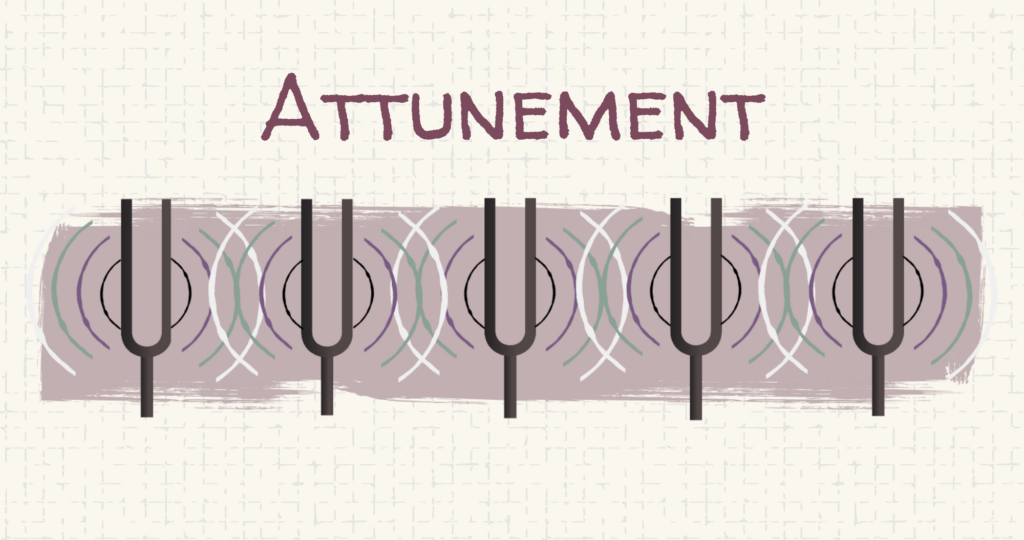How to attune your team
How do you access the collective wisdom of the Heart Center of Intelligence to attune your team? Every team, if they want to become high-performing, needs to create a collective felt sense of being in this together.
Attuned teams feel deeply connected to other team members’ feelings and needs. Attunement fuels the energy and passion to move forward together. They are responsive to one another and to the team as a whole because they know and care about each person. Attuned teams are also passionate about the work they do together because they understand its contribution to the organization and their customers. Some refer to this as team resonance, like tuning forks working together in harmony.
Teams have specific attunement challenges at each of the four stages of team development: forming, storming, norming and performing.
Forming attunement (relationships and process) challenges
Who are we, both as individuals and as a team, and are we all fully included as team members?
Storming attunement (relationships and process) challenges
Are we bringing up and resolving areas of disagreement in a constructive way?
Norming attunement (relationships and process) challenges
Are we using the most effective communication, problem-solving and decision-making skills?
Performing attunement (relationships and process) challenges
Are we agile, resilient and deeply supportive of each other, while also making sure we do not experience “burnout”?
To attune your team, the team needs to address each of these challenges as the team reaches each consecutive stage. Otherwise, the unresolved issues will either keep them from progressing to the next stage or the team may never even reach the next stage.
But what does the Enneagram have to do with team attunement? How can the Enneagram help teams become more attuned?
Use the Centers of Intelligence
Help the team understand the three Centers of Intelligence and have them explore if they, as a team, are using their collective Heart Center in service of the team. Depending on the team’s stage of development – forming, storming, norming or performing – have the team discuss the attunement challenges for that stage and then reach collective agreements.
What does Enneagram type have to do with this?
Although most people of all Enneagram types truly enjoy working on an attuned team, they often don’t know what they can do to achieve this. In other words, many think that attunement either happens or it doesn’t. The two major exceptions to this are Enneagram Twos and Fours, who are attuned to attunement and understand the importance of team resonance. The pathway to resonance is often through self-disclosure and honest sharing.
However, most teams become so over-focused on accomplishing the team’s tasks that they don’t take the time to really get to know one another or to inquire about how each person is doing. And if some team members bring up the importance of relationships and processes that bind them together as a team, other team members may discount their ideas. They think there is so much work to be done, there’s no time for anything else.
The other exception to jumping over team attunement issues is Enneagram Nines. They focus less on attunement through emotional sharing and more on creating team harmony, where everyone feels seen, respected, listened to and valued. These are also important ingredients contributing to team attunement. Again, this perspective may get discounted.
The remaining six Enneagram types – Ones, Threes, Fives, Sixes, Sevens and Eights – jump headlong into the team task, and this overshadows the time it takes for teams to get attuned at each stage of team development. All they have to do, and it really is this simple, is to slow down the speed at which the team operates and take the time to connect with other team members in a meaningful way.
In the next blog, you’ll learn about how teams can accelerate better using the Enneagram. A team can be aligned and attuned, but it also needs to accelerate. This blog series is based on Ginger’s forthcoming book, Transform Your Team with the Enneagram: Build Trust, Decrease Stress, and Increase Productivity.
Ginger Lapid-Bogda PhD, author of eight Enneagram books, is a speaker, consultant, trainer, and coach. She provides certification programs and training tools for business professionals around the world who want to bring the Enneagram into organizations with high-impact business applications. TheEnneagramInBusiness.com |ginger@theenneagraminbusiness.com


Comments are closed.